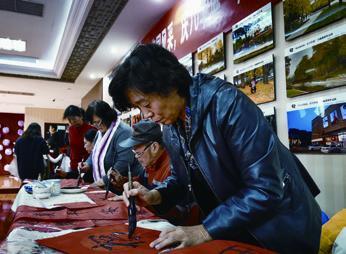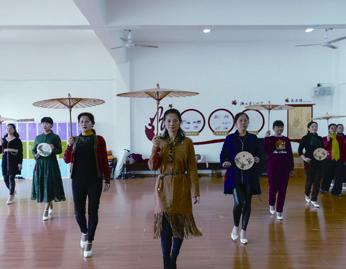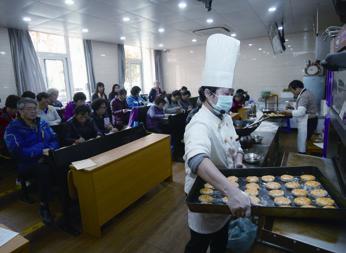Never Too Late to Learn
2020-02-17ByLiQing
By Li Qing
In 2019, Beijing announced a new policy, allowing people over 60 to ride public buses free. It was welcomed by Guo Huijuan, 62, who takes Bus 618 to Haidian Senior University for painting class twice a week.
“Distance is not a problem because I can enjoy the scenery along the route,”she told Beijing Review of her three-hour roundtrip bus ride. What inspires her is the happiness she feels attending university for the fi rst time.
Growing up in a literary family, Guo wanted to learn to paint at a very young age. But her dream wasnt realized until 2016 when she began studying fl ower and bird painting at Haidian Senior University. In 2019, she also enrolled in a calligraphy class, along with painting.
Since she started art studies, her life has changed dramatically. The time she used to spend watching television is now dedicated to practicing painting and calligraphy. As a teaching assistant, she also has added responsibilities to serve other students.
Since many senior citizens like Guo did not attend university in their prime years, they cherish the chance to study now, said Liang Caiping, Executive Vice President of Haidian Senior University, the first school for the elderly in Beijing established in 1984. Unlike regular universities, it aims to enrich older peoples life, provide them with more entertainment options and expand their connections with society.

Seniors paradise
With the support of the local government, Haidian Senior University has grown into a mature institution. Currently, with 2,700 students, it offers courses in calligraphy, painting, seal engraving, photography and rubbing, each costing only 300 yuan ($44) per semester.
It occupies two fl oors in an offi ce building in the core area of Zhongguancun, Beijings tech hub. The area, which is home to thousands of hi-tech enterprises, is a perfect location, with convenient transportation, advanced facilities and of course, high rents. But as the venue is provided by the government, the school has to pay for
only electricity, water and property management fees.
The demand for its classes is exceptionally strong. “Applicants used to queue up in front of the building the night before the enrollment day,” Liang said, adding that after an online registration system was launched, competition became even more acute.
Guo said she likes to spend time at the school because she gets a sense of belonging. Making new friends helps her feel energetic and positive since they talk about their learning experiences rather than problems at home.
“The older you get, the more you need peace of mind and a positive attitude toward life, which is good for health,” Liang told Beijing Review.
At the same time, interactions with other students at the school can render emotional support, which society and families cant always provide, especially for empty-nesters, Liang said.
She stressed that having a role to play in society is essential to senior citizenswellbeing. Many students are exploring new areas through volunteering, using the skills they learn at Haidian Senior University. For instance, students who have achieved a high level of photography skills take photos for couples celebrating their golden or diamond anniversaries.
The development of senior universities showcases the progress in building a moderately prosperous society in all respects, as people are willing to invest in lifelong education, Liu Junhai, a professor at Renmin University of Chinas Law School, told Legal Weekly.
Further development
To accelerate the development of senior education, the State Council, Chinas cabinet, released a document in 2016, underlining the importance of creating new service models and accelerating the modernization of the industry to meet the rising demand.
In 2019, a new guideline was issued by the State Council, which said a complete senior education network including institutions at all levels should be shaped. It also rolled out a plan to establish a platform where all education agencies can organize activities and share resources that include curricula and teachers.
The document also proposed a new elderly care model combining nursing and education. Dang Junwu, Deputy Director of the China Research Center on Aging, said medical treatment has become part of regular services in many nursing centers, while elderly education is not.
“Senior education should be part of national strategies to cope with an aging population,” Dang said at the Tsinghua Aging Industry Forum in Beijing in April 2019. “It is of great importance to help senior citizens increase awareness in all aspects such as psychology to improve their quality of life rather than simply leaving them in nursing homes.”
Today, there are over 76,000 senior universities in China, admitting over 8 million students, according to the China Association of the Universities for the Aged(CAUA). However, as the elderly population has reached 250 million and continues to grow, there is a huge demand in this fi eld. According to Guangming Daily, in the next fi ve years, the number of senior citizens attending education institutions will increase to 20 percent of the total, exceeding 50 million.
“In the past, we did not pay enough attention to senior education, but now, as the aging tide continues, the gap between supply and demand is growing into a severe challenge,” Zhao Zheng, a researcher from the Development Research Center of the State Council, told Legal Weekly, citing the fact that most learning institutions for the elderly are in cities, resulting in imbalanced development.
To address this problem, more community senior universities need to be set up, Zhang Xiaolin, President of CAUA, told Peoples Daily.
During this process, institutions with good track record should function as demonstration sites and share their experience with latecomers in the market. New schools should make their plans according to their conditions and features after studying fi ne examples in big cities, Liang told Beijing Review.
Given that there is imbalanced development within the industry and resources are concentrated in cities, Zhang said it is necessary to give play to distant learning. Thanks to fl exibility, low cost and rich content, people living in rural areas can now have access to what they want to learn through technological advancements.


Another issue is that the senior universities doing well are generally public institutions, while private ones face tough- er situations. Lacking government support, they are plagued by high operational costs.“The authorities should encourage private investment in the senior education industry to meet the increasing demand,” Zhang said.
Echoing Zhangs call, Zhao suggested that the authorities should offer more preferential policies for private schools, including tax cuts.
